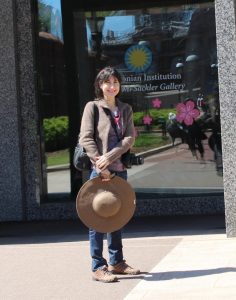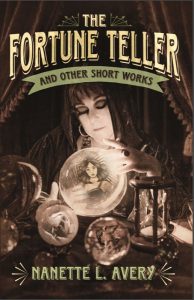The making of The Fortune Teller and Other Short Works by Nanette L. Avery
 Inspiration comes to us when we least expect it. Its provocation can erupt suddenly as if fallen from the night sky while we wander the stars, realized in the chemistry lab mixing and measuring, or found while listening to the roar of Niagara Falls. As unique as a one’s fingerprints or as communal as a view from the Grand Canyon, whatever experience has crossed our path to provoke us to create, to discover, to invent, to reshape, an inspiration is clearly an unexpected gift.
Inspiration comes to us when we least expect it. Its provocation can erupt suddenly as if fallen from the night sky while we wander the stars, realized in the chemistry lab mixing and measuring, or found while listening to the roar of Niagara Falls. As unique as a one’s fingerprints or as communal as a view from the Grand Canyon, whatever experience has crossed our path to provoke us to create, to discover, to invent, to reshape, an inspiration is clearly an unexpected gift.
So it is with a story that stirs and courses around in your head with such a commotion that you must release it into the wild…kind of like a firefly in a jar buzzing about, hitting the sides…all lit up flitting up and down… so pretty to look at but we know it must be liberated.
When we’re young, we learn that humans are equipped with five senses. Those creators of music, culinary delights, the visuals, movement, all such artists are invested in the production of arousing specific senses. But then behold the author, the person who seems to be much like the outlier in a mathematical problem. This is the artist who is expected to stimulate all the senses.
Recipients of their work challenge the writer to depict the setting, demand entry into the characters’ emotions, expect to hear their voices, taste their meals, feel the path beneath their feet as they walk, and experience a journey across an ocean or simply a street. It is a most daunting task all succinctly packaged in what we know as a book. And this is what I, the author, must set out to do, lead the reader so that he or she is left satisfied in a way that they wish to return for more.
One day, my cat was staring at me, as she often does, and plainly said, “Go ahead,” so I did. That’s when I realized sometimes there is an anthropomorphic view of the world, but most of the time it’s a woman’s view. The Fortune Teller and Other Short Works was written with just that notion, from a woman’s point of view. Open to interpretation, there are no disclaimers such as those printed on food labels containing peanuts: “this product may cause allergic reactions.” Rather, the work is completed and delivered like an artist stepping out of the shower nude; for without any coverings or explanations the receiver simply finds an honest look at the world.
The Fortune Teller and Other Short Works is a series of small moments, and like an inkblot, the reader attaches their own relationship with the content. As an author, I ask of the reader to put aside their preconceived notions and observe life’s ironies, humor, and just simple day to day events. Having grown up in what may be considered the hay day of the Woman’s revolution, I have the luxury of having experienced a slowly changing world.
Best exemplified metaphorically in the fashions of the era, an excerpt from my story, A Matter of Fate, illustrates a world in flux. “Mother was gone, and here I was, the only freshman in college that wore a white dress to the first day of school. But then again, others probably had not just come off a plane from the Virgin Islands. I was sure of this when I had arrived for as I walked up the steps to T- Hall with all my possessions in hand, my clothes and a portable typewriter, there was a line of station wagons double-parked and overflowing with belongings that resembled a loading dock… “It was possible that they had made a grave error in the admissions office,” I thought. I glanced down at my shoes, white sandaled heels and then back under the desk of my roommate. “How did she find black army boots in a lady’s size?” I turned slowly and looked out the window and then back to the desk when I noticed my roommate was gone. She was stealth even in those clunky boots. I admired that about her; there was a brazen wildness surrounding this girl. … I was a Persian cat in an alley and knew that I had to ditch the dress…”
For me, writing from a woman’s point of view is not a radical departure from any of my other titles. This book is not an angry woman’s rant against a male-oriented world. Rather, it is a compilation of stores that all genders will enjoy; it’s just that perhaps “the sisterhood” will enjoy it a little bit more. And so, I leave you with this short piece from The Fortune Teller and Other Short Works, and I believe you will see what I mean.
Do Great Women Vacuum?
Each morning
Riding the number 32 bus
I see angels
Going to work.
They step down
Leaving behind rose
And lavender scents
That cling to my skirt.
Their starched uniforms
Melt into gray mornings
Till only a bleached silhouette
Fades into each house.
And at night
When they return home
They continue to vacuum
Their ordinary lives.
—
Nanette L. Avery, novelist and short story writer, is best known for her historical fiction, Orphan in America, which earned distinction as one of the “Best Indie Books” by Kirkus Reviews. Her most recent title The Fortune Teller and Other Short Works was inspired by her father, a man of great intellect and wit. Growing up in the Virgin Islands, Avery’s diverse experiences as zoo designer, toy library director, educator, and artist contribute to the book’s wide-ranging themes. As a mother and wife, she asserts that “Behind every great writer is a good listener.” Nanette lives outside Nashville, Tennessee with her husband, Craig, and their orange cat.
Follow her on Twitter https://twitter.com/navery101
Find out more about her on her website https://www.nanetteavery.biz/
THE FORTUNE TELLER AND OTHER SHORT WORKS
 In a style of her own, Nanette L. Avery weaves together an imaginative and wide-ranging collection of short works from a woman’s point of view. Created with the same skillfully crafted techniques that have defined her writing, Avery offers readers wry humor, surprise endings, strange encounters, and “oh, that’s cool” in her latest book, The Fortune Teller and Other Short Works. Here destitute women follow behind Civil War troops, a fortune teller reveals an outlandish prediction, unidentified photographs possess a dead man’s secret, an ordinary couple devises sinister plans, and a menagerie of other characters step into places and ideas that are often familiar yet strange.
In a style of her own, Nanette L. Avery weaves together an imaginative and wide-ranging collection of short works from a woman’s point of view. Created with the same skillfully crafted techniques that have defined her writing, Avery offers readers wry humor, surprise endings, strange encounters, and “oh, that’s cool” in her latest book, The Fortune Teller and Other Short Works. Here destitute women follow behind Civil War troops, a fortune teller reveals an outlandish prediction, unidentified photographs possess a dead man’s secret, an ordinary couple devises sinister plans, and a menagerie of other characters step into places and ideas that are often familiar yet strange.
In the world of the short fiction, The Fortune Teller and Other Short Works presents an opportunity to take a hiatus from a labyrinth of lengthy text. Stories, such as the realistic narrative of The Lincoln Tunnel will strike a familiar chord for urban travelers. Set in Newark, New Jersey’s bus terminal, a commute into Manhattan describes a more than realistic ride laced with dead-pan humor. Lorenzo’s Produce captures the private revelations of a group of women all set in a most ordinary place, a grocery store, exposing innuendoes and the unspoken allusions of your everyday housewife. With more than thirty works to choose from, the collection brings together a cast of characters that say and do what most of us would only think. Endings with a twist do not go beyond reason, but adhere to logical conclusions, while the brevity of some of the pieces are like a tap on the shoulder reminiscent of our own private thoughts.
Written in “matter-of-fact language,” readers are invited to observe the curious details of everyday and not so everyday life. Sometimes short, sometimes mini, and sometimes blunt, all will entertain. And then, in a flash…they’re gone.
Category: How To and Tips






























